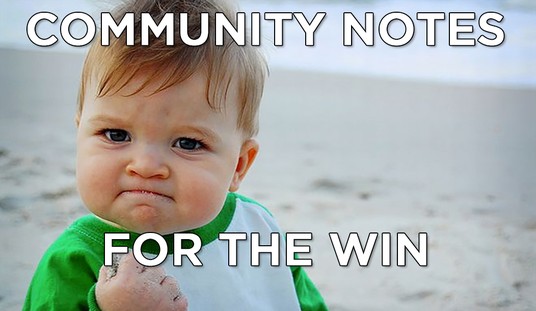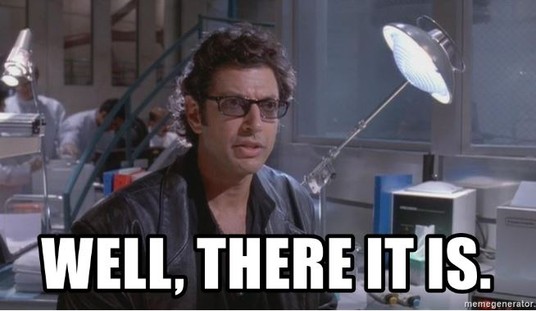We present to you once again a thread that needs no real introduction from us other than to tell you it was written in response to David French writing about reforming the justice system.
And it’s freakin’ awesome.
Take a look.
I read this post by @DavidAFrench to hear his arguments and heart. That said, this essay suffers from the same problems most analyses on crime and punishment in this country do: 1) a lack of specificity, 2) misplaced sympathies, 3) and an unwillingness to assess tradeoffs. https://t.co/HNkQh4tEgA
— Delano Squires (@DelanoSquires) September 26, 2021
What’s great about Squires’ thread is he isn’t unkind or snarky, he’s just very factual and to the point.
Keep going.
As is often the case in this area, David never says WHY people in this country are incarcerated. Before I do that, it is helpful to know what the ecosystem of confinement looks like. There are about 630K ppl in local jails.
— Delano Squires (@DelanoSquires) September 26, 2021
Some are awaiting trial, some are serving short sentences (< 1 yr), and some are serving the final stretch of a longer prison sentence. There are about 160K ppl in federal prison. About 45% are in for serious drug trafficking and another 40% for Public Order crimes [Table 15]. pic.twitter.com/Vz1oqJBmjP
— Delano Squires (@DelanoSquires) September 26, 2021
The largest part of the confinement ecosystem is the state prison system. This is where over 1.2M people are incarcerated. If you let “criminal justice” reformers tell it, you’d think most are there for low-level nonviolent drug crimes. But that is simply untrue.
— Delano Squires (@DelanoSquires) September 26, 2021
Recommended
Simply untrue.
More than half (55%) of all prisoners are there for violent offenses, including murder, rape, robbery, and assault. About 16% are locked up for property crimes, 12% for public order, and only 14% for drugs. Yes, you read that right. FOURTEEN PERCENT for drug crimes [Table 13]. pic.twitter.com/buhFmXvqwx
— Delano Squires (@DelanoSquires) September 26, 2021
Wow. Only 14% for drug crimes.
From the way our friends who push criminal justice reform tell it, you’d think the majority of people incarcerated are from nonviolent drug crimes.
And lest you think there is some hidden racial disparity that explains this, please note that there is a higher % of whites (16%) in prison for drugs than blacks (13%). The unfortunate fact is that violent offenses are what drive the racial disparity in incarceration.
— Delano Squires (@DelanoSquires) September 26, 2021
Who knew?
There are more black people incarcerated for murder alone (70,800) than all drug crimes (52,100) [Table 14]. This is the bookend to another sad reality—the fact that the black homicide victimization rate is about 6x higher than that of whites. pic.twitter.com/693Eo3KFwf
— Delano Squires (@DelanoSquires) September 26, 2021
All of the available data (CDC, FBI, local crime statistics) supports this claim. We never hear about it because the people who write about these issues are long on rhetoric about justice and “mass incarceration” but short on actual data.
— Delano Squires (@DelanoSquires) September 26, 2021
Long on rhetoric but short on data.
Ain’t that the truth?
As is the case in many other areas of American life, the people with the loudest megaphones have NO IDEA what they are talking about. They make arguments based on well-worn talking points, euphemisms, and a desire to look like compassionate, empathetic people.
— Delano Squires (@DelanoSquires) September 26, 2021
Desire to look like compassionate, empathetic people.
We see a LOT of that, especially when dealing with liberal white women. It’s true.
This inability or unwillingness to deal honestly with the data causes the second problem—misplaced sympathies. You hear it even in how the issues are framed—CRIMINAL justice vs. PUBLIC safety. So French and others think America has an “over incarceration” problem.
— Delano Squires (@DelanoSquires) September 26, 2021
But he never says what the appropriate level of incarceration should be. Reformers never do. They note a disparity and assume the main problem is the effect, not the cause. He also notes that prison doesn’t have the rehabilitative effects many citizens desire.
— Delano Squires (@DelanoSquires) September 26, 2021
But what people who live FAR from belly of the beast fail to realize is that while it is amazing to see a person turn their life around in prison, the main point of removing ppl from society is to PROTECT the law-abiding and innocent from the law-breaking and guilty.
— Delano Squires (@DelanoSquires) September 26, 2021
To protect the INNOCENT from the guilty.
Ding ding ding.
I highly doubt French would argue that we should rethink prosecuting hate crimes because perpetrators may become even more racist in prison. And I certainly don’t see him writing an article in The Root explaining to black people why such a move would advance the cause of justice.
— Delano Squires (@DelanoSquires) September 26, 2021
Lastly, there is the issue of policy trade-offs. If reformers think that theft under $1000 should not be prosecuted, they should be prepared to speak honestly about the effects that decision will have on the victims—whether CVS or the mom-and-pop store—and the community at large.
— Delano Squires (@DelanoSquires) September 26, 2021
Told you this thread is awesome.
Same with other offenses, including violent ones. When order declines—often abetted by bad public policy—the slide into chaos is quick and costly. Reformers talk a good game until the first shot pierces their window or until their child is the one who is carjacked at gunpoint.
— Delano Squires (@DelanoSquires) September 26, 2021
The truth is, given the right circumstances, we ALL desire vengeance. Prioritizing the guilty over the innocent is not a standard of justice I recognize, whether from the Bible or or any other source.
Source data: https://t.co/Nwf4P3pxov
— Delano Squires (@DelanoSquires) September 26, 2021
Seems French needs to work on his opinions on justice reform and should perhaps chat with Delano Squires.
***
Related:

























Join the conversation as a VIP Member